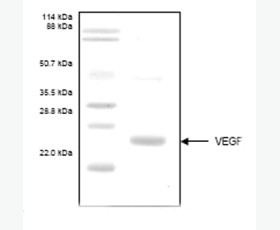Recombinant Human Serpin A3/alpha-1-Antichymotrypsin
| Product name: | Recombinant Human Serpin A3/alpha-1-Antichymotrypsin |
| Source: | Human Cells |
| Purity: | Greater than 95% as determined by reducing SDS-PAGE. |
| Buffer Formulation: | Lyophilized from a 0.2 μm filtered solution of 20mM HEPES, 150mM NaCl, pH 7.5. |
| Applications: | Applications:SDS-PAGE; WB; ELISA; IP. |
| Storage: | Avoid repeated freeze/thaw cycles. Store at 2-8 oC for one month. Aliquot and store at -80 oC for 12 months. |
| UOM: | 100ug/50ug/200ug/1mg/1g |
| Source | Human Cells |
| Description | Recombinant Human Serpin A3 is produced by our Mammalian expression system and the target gene encoding His24-Ala423 is expressed with a 6His tag at the C-terminus. |
| Names | Alpha-1-Antichymotrypsin, ACT, Cell Growth-Inhibiting Gene 24/25 Protein, Serpin A3, SERPINA3, AACT |
| Accession # | P01011 |
| Formulation | Lyophilized from a 0.2 μm filtered solution of 20mM HEPES, 150mM NaCl, pH 7.5. |
| Shipping |
The product is shipped at ambient temperature. |
| Reconstitution |
Always centrifuge tubes before opening. Do not mix by vortex or pipetting. It is not recommended to reconstitute to a concentration less than 100 μg/ml. Dissolve the lyophilized protein in ddH2O. Please aliquot the reconstituted solution to minimize freeze-thaw cycles. |
| Storage |
Lyophilized protein should be stored at < -20°C, though stable at room temperature for 3 weeks. Reconstituted protein solution can be stored at 4-7°C for 2-7 days. Aliquots of reconstituted samples are stable at < -20°C for 3 months. |
| Purity |
Greater than 95% as determined by reducing SDS-PAGE. |
| Endotoxin | Less than 0.1 ng/µg (1 IEU/µg) as determined by LAL test. |
| Amino Acid Sequence |
HPNSPLDEENLTQENQDRGTHVDLGLASANVDFAFSLYKQLVLKAPDKNVIFSPLSISTALAFLS LGAHNTTLTEILKGLKFNLTETSEAEIHQSFQHLLRTLNQSSDELQLSMGNAMFVKEQLSLLDRF TEDAKRLYGSEAFATDFQDSAAAKKLINDYVKNGTRGKITDLIKDLDSQTMMVLVNYIFFKAKWE MPFDPQDTHQSRFYLSKKKWVMVPMMSLHHLTIPYFRDEELSCTVVELRYTGNASALFILPDQDK MEEVEAMLLPETLKRWRDSLEFREIGELYLPKFSISRDYNLNDILLQLGIEEAFTSKADLSGITG ARNLAVSQVVHKAVLDVFEEGTEASAATAVKITLLSALVETRTIVRFNRPFLMIIVPTDTQNIFF MSKVTNPKQAVDHHHHHH
|
| Background | Serpin A3 belongs to the Serpin superfamily of serine protease inhibitors. Serpin A3 has been shown to inhibit some serine proteases, such as neutrophil cathepsin G and mast cell chymase. Serpin A3 is synthesized initially in the liver and secreted in plasma. Serpin A3 has been found in the amyloid plaques from the hippocampus of Alzheimer disease brains. In addition to, Serpin A3 is associated with liver disease and Parkinson disease and chronic obstructive pulmonary disease. |














